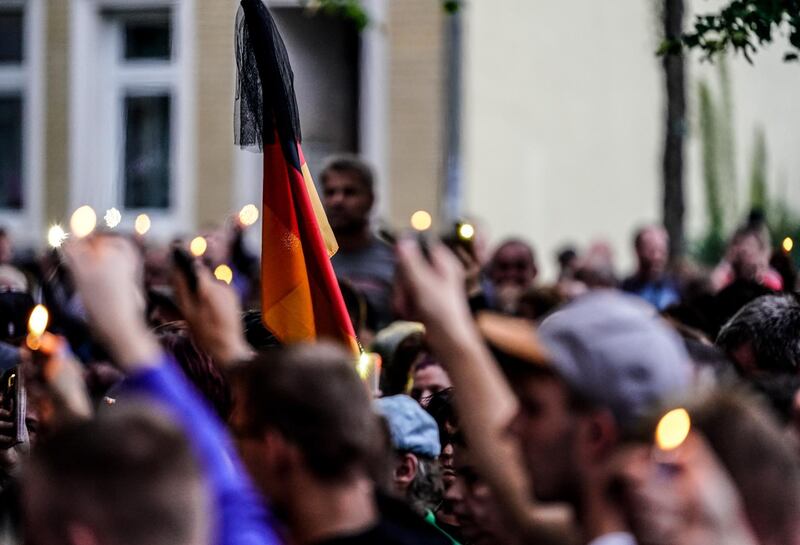Up to 2,500 people marched in a far-right demonstration in eastern Germany on Sunday after a man died after a fight with two Afghans.
Authorities pleaded for calm to try to avoid the anti-foreigner unrest that has shaken Chemnitz.
Police and prosecutors said the 22-year-old victim suffered acute heart failure after coming to blows with the Afghan men during a dispute at a playground in the town of Koethen late on Saturday.
The German man’s death was “not directly” linked to the injuries suffered in the brawl, they said in a statement, and media reports said he had a pre-existing heart condition and died in hospital.
Prosecutors said one of the Afghan suspects, aged 18, is accused of causing grievous bodily harm. The other, 20, faces charges of causing bodily harm with fatal consequences.
_______________
Read more:
German spy chief at odds with Merkel over hounding of migrants in Chemnitz
German authorities take aim at far-right party’s youth wing
_______________
The incident was expected to inflame anti-migrant tensions, coming just two weeks after the fatal stabbing of a 35-year-old German man in the city of Chemnitz, allegedly by two asylum seekers.
“With emotions running high, we have to resist any attempt to turn Koethen into a second Chemnitz,” the state premier of Saxony-Anhalt, Reiner Haseloff, told DPA news agency.
Chemnitz, also located in Germany’s former Communist east, has been rocked by a series of far-right demonstrations in which participants have assaulted people thought to be migrants and have shout anti-immigration slurs. Some have even flashed the illegal Nazi salute.
Immediately after news of the latest incident, right-wing groups called on social media for a "mourning march" in Koethen from 7pm local time.
Police estimated the turnout at 2,500 people, and reported no major disturbances. Many of the demonstrators waved the German flag and shouted “Resistance! Resistance!”.
A counter-demo by far-left protesters at Koethen’s railway station drew 200 people, according to police.
Mayor Bernd Hauschild, in a Facebook message, urged locals to shun the right-wing demo because he had “information that people prepared to use violence were planning to travel to Koethen in large numbers”.
Bild newspaper said up to 100 federal police officers were sent to Koethen to help keep the peace, after police were criticised for underestimating the scale of the Chemnitz demostrations.
According to local media, the latest incident started when three Afghan men started arguing with a pregnant woman over who was the father of her unborn child.
Two German men then approached the group and the row escalated into a brawl.
The third Afghan was not arrested as he is believed to have avoided the fight.
Local residents and politicians on Sunday placed flowers and candles at the scene.
State Interior Minister Holger Stahlknecht said on Twitter that he deeply regretted “the tragic death” and understood citizens’ concerns.
But he urged residents to “keep calm” and let justice run its course.
The recent unrest in Chemnitz in neighbouring Saxony has reignited the debate in Germany about chancellor Angela Merkel’s 2015 decision to open the country’s borders, at the height of Europe’s migrant crisis.
More than a million asylum seekers have arrived since then, dividing Germans and fuelling the rise of the far-right Alternative for Germany (AfD) party.
Ms Merkel has strongly condemned the angry mobs in Chemnitz, saying there was no place for “hate in the streets”.
But Interior Minister Horst Seehofer of the CSU sister party, and one of Ms Merkel’s fiercest critics, blasted immigration as “the mother of all political problems”.
It also emerged at the weekend that a Jewish restaurant was attacked on the sidelines of the Chemnitz protests on August 27.
The owner told AFP that a dozen masked neo-Nazis shouted: “Jewish pig, get out of Germany!” and hurled rocks, bottles and a metal pipe at the Schalom restaurant.
The attack showed there was a deep problem with right-wing extremism in the region and should be treated as a call to action, the head of Germany's Central Council of Jews said on Sunday.
Josef Schuster, who previously condemned the far-right protests in Chemnitz, said “we need to call the problem by its name”.
“The racist riots and the attack on the kosher restaurant in Chemnitz show how strongly rooted right-wing extremism is in the region,” he said.
The head of the New York-based World Jewish Congress also criticised the “reprehensible” attack.
“It is inconceivable and outrageous that neo-Nazi elements or Nazi-inspired individuals in Germany continue to feel empowered to engage in violent acts against Jews and other minorities,” Ronald Lauder said.
Mr Seehofer told public broadcaster ARD on Sunday that Germany faced three big challenges: growing right-wing radicalism, “worrying” anti-Semitism and violent crimes committed by foreigners.
“We aren’t blind to any of this,” he said.






